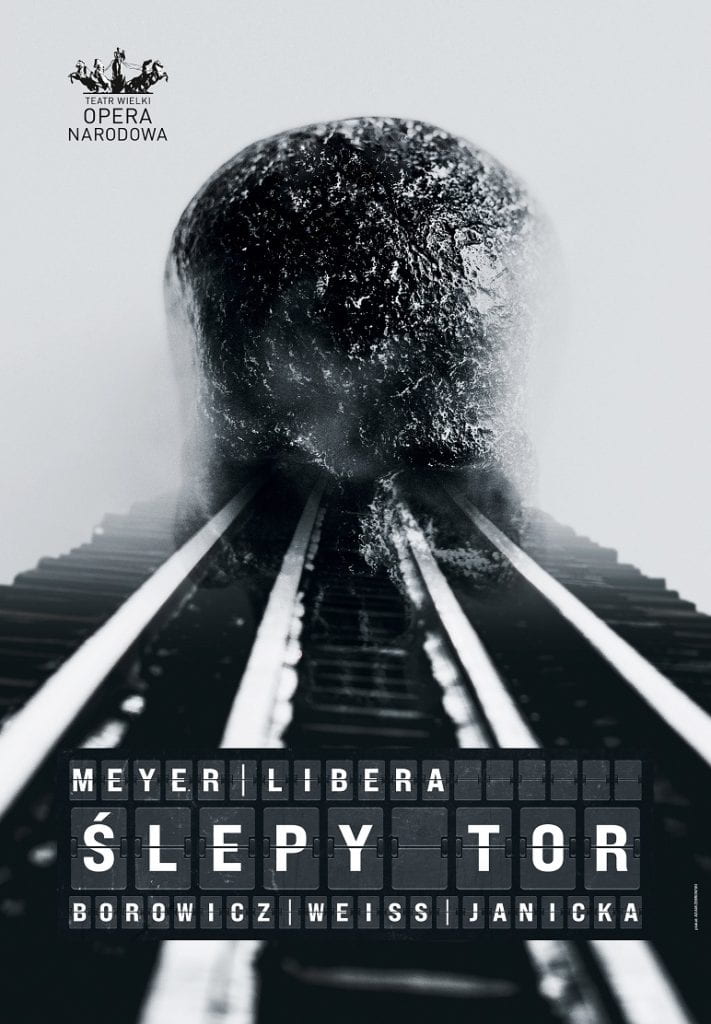Krzysztof Meyer, a distinguished Polish composer who celebrated his eightieth birthday earlier this year, was celebrated once again after the October 14 premiere of his latest opera, Ślepy tor [Dead-end Siding] at Warsaw’s Teatr Wielki—National Opera.
The opera’s libretto, co-authored by the composer with Antoni Libera (a writer and expert on Samuel Beckett), touches on the theater of the absurd, mixing grotesque elements with philosophical musings that relate closely to the state of affairs of the contemporary world.
The action takes place at a railway station somewhere in Alpos, a fictitious principality located in the heart of Europe. To catch their connections, passengers traveling to various European destinations must first reach the Swiss capital Bern, where all international express trains call. Among the assembled crowd is a group of Modernists en route to a worldwide congress in Paris, where the design for the new flag for Mother Earth will be debated. Other waiting passengers include Conservatives traveling to the “Holy Days” celebrations in Rome; there are also a few mysterious barbarians/terrorists who are preparing to stage a dangerous action in Berlin.
Because Alpos trains are chronically late, all passengers are likely to miss their connections in Bern. This problem is unexpectedly solved when a man depressed about the world’s chains himself to the rails in a suicide attempt. Trying to save the man’s life and avoid a possible disaster, the local station master is forced to stop the incoming intercity train, thus allowing all assembled passengers to board it.

Marek Weiss, an experienced hand in operatic productions, was hired to direct, while another opera expert, Łukasz Borowicz, led the National Opera Orchestra and served as music director for Ślepy tor. The two leading roles were given to Krzysztof Szumański (the suicidal man) and Stanisław Kuflyuk (station master). Set design was provided by Jagna Janicka while Izadora Weiss oversaw choreography. Several additional performances of Meyer’s new opera were held throughout the last two weeks of October.
In a recent email to the Polish Music Center, Krzysztof Meyer shared his impressions from the October 14 Warsaw premiere:
I’m filled with admiration for everyone connected in any way to this operatic production. From the initial discussions (that took place four years ago), everything worked just like a Swiss watch. There were no delays, and everyone delivered everything on time. I experienced eight operatic premieres in in my life and never encountered such perfect organization. The performance was, in every respect, on the highest level. One could sense tension in the auditorium, possibly due not only to the artistic challenges but also to the political situation. The show almost didn’t happen at all.
– Krzysztof Meyer
Perhaps you’ve heard about an incident—the press reported on it around the world—that at the Piłsudski Square, right near the Grand Opera Theatre, someone climbed up the Smoleńsk air disaster monument and declared that he’ll detonate himself. He remained perched on it for a good few hours. Police cordoned off all streets leading to the Piłsudski Square, including the entrance to the Opera Theatre! Without exaggerating, several dozen police cars and anti-terrorist units were stationed nearby, and the Opera was closed! The Opera director feared that if the suicidal man remained on top of the monument for a few more hours, the world premiere would have to be postponed. Fortunately, the man finally gave up and the situation returned to normal towards the evening hours.
In Act I of the opera, the station master who prevents the man chained to the rail tracks from committing suicide calls out to him with the line, “If you want to kill yourself, do it at home rather than in a public place” which elicited chuckles from the amused audience. In the opera’s finale, all soloists jointly voice the line, “See you at the next show” to which the station master replies, “Unless the theatre will be closed!” This provoked wild cheers and laughter from the audience who, in general reacted very positively after the premiere and applauded the performance for about quarter of an hour. The performance overall turned out to be witty and cheerful and all texts were clearly heard. So, that’s my news…”
The Polish Music Center is entirely donation-based, for everything from our operational budget to the growth of our vast library and rare archives. If you’ve found our website interesting and helpful, please visit our Donations Page. There you can donate directly to the PMC, knowing that a gift of any amount helps keep our website flourishing and our doors open. Thank you!
